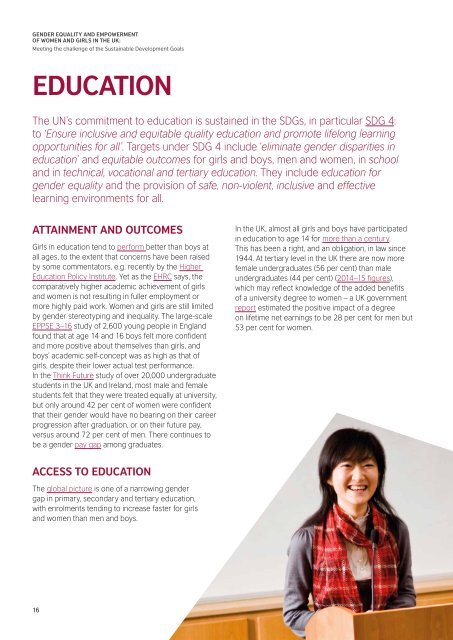GENDER EQUALITY AND EMPOWERMENT OF WOMEN AND GIRLS IN THE UK
gender_equality_an_empowerment_in_the_uk
gender_equality_an_empowerment_in_the_uk
You also want an ePaper? Increase the reach of your titles
YUMPU automatically turns print PDFs into web optimized ePapers that Google loves.
<strong>GENDER</strong> <strong>EQUALITY</strong> <strong>AND</strong> <strong>EMPOWERMENT</strong><br />
<strong>OF</strong> <strong>WOMEN</strong> <strong>AND</strong> <strong>GIRLS</strong> <strong>IN</strong> <strong>THE</strong> <strong>UK</strong>:<br />
Meeting the challenge of the Sustainable Development Goals<br />
EDUCATION<br />
The UN’s commitment to education is sustained in the SDGs, in particular SDG 4:<br />
to ‘Ensure inclusive and equitable quality education and promote lifelong learning<br />
opportunities for all’. Targets under SDG 4 include ‘eliminate gender disparities in<br />
education’ and equitable outcomes for girls and boys, men and women, in school<br />
and in technical, vocational and tertiary education. They include education for<br />
gender equality and the provision of safe, non-violent, inclusive and effective<br />
learning environments for all.<br />
ATTA<strong>IN</strong>MENT <strong>AND</strong> OUTCOMES<br />
Girls in education tend to perform better than boys at<br />
all ages, to the extent that concerns have been raised<br />
by some commentators, e.g. recently by the Higher<br />
Education Policy Institute. Yet as the EHRC says, the<br />
comparatively higher academic achievement of girls<br />
and women is not resulting in fuller employment or<br />
more highly paid work. Women and girls are still limited<br />
by gender stereotyping and inequality. The large-scale<br />
EPPSE 3–16 study of 2,600 young people in England<br />
found that at age 14 and 16 boys felt more confident<br />
and more positive about themselves than girls, and<br />
boys’ academic self-concept was as high as that of<br />
girls, despite their lower actual test performance.<br />
In the Think Future study of over 20,000 undergraduate<br />
students in the <strong>UK</strong> and Ireland, most male and female<br />
students felt that they were treated equally at university,<br />
but only around 42 per cent of women were confident<br />
that their gender would have no bearing on their career<br />
progression after graduation, or on their future pay,<br />
versus around 72 per cent of men. There continues to<br />
be a gender pay gap among graduates.<br />
In the <strong>UK</strong>, almost all girls and boys have participated<br />
in education to age 14 for more than a century.<br />
This has been a right, and an obligation, in law since<br />
1944. At tertiary level in the <strong>UK</strong> there are now more<br />
female undergraduates (56 per cent) than male<br />
undergraduates (44 per cent) (2014–15 figures),<br />
which may reflect knowledge of the added benefits<br />
of a university degree to women – a <strong>UK</strong> government<br />
report estimated the positive impact of a degree<br />
on lifetime net earnings to be 28 per cent for men but<br />
53 per cent for women.<br />
ACCESS TO EDUCATION<br />
The global picture is one of a narrowing gender<br />
gap in primary, secondary and tertiary education,<br />
with enrolments tending to increase faster for girls<br />
and women than men and boys.<br />
16


